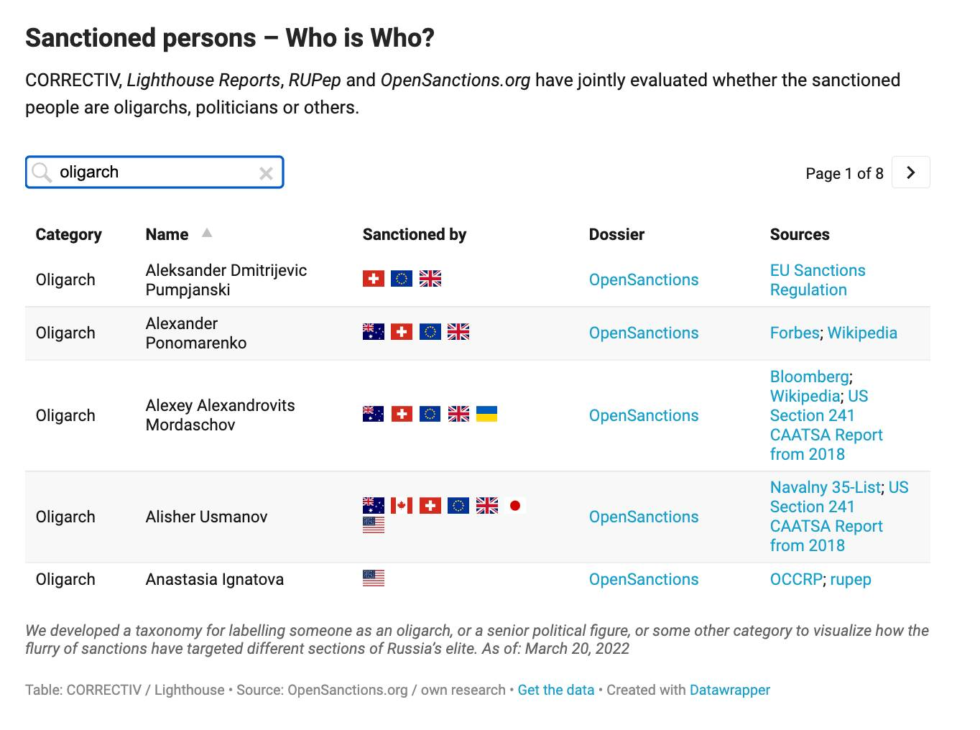Tagging the Oligarchs

The war in Ukraine has thrown an unprecedented spotlight on Russian oligarchs, triggered waves of sanctions and made them an urgent priority for investigative journalists.
Lighthouse Reports is meeting the challenge by working intensively with partners Correctiv, RUPep and Open Sanctions to enrich raw Russian sanctions data in ways that can serve the journalistic community and public interest.
Beyond the headlines there are complex questions to answer: Who is an oligarch? How many are there? Who else has been sanctioned? Making sense of these questions requires adding meaning and context to the raw data. Lighthouse has defined and categorised more than 500 Russians and Belarusians added to international sanctions lists since January 1.
Working with partners we have developed a methodology for labelling someone an oligarch, or a senior political figure, or another category. Adding these labels to the 500+ names, we can now visualise how the flurry of sanctions have targeted different sections of Russia’s elite. We have also linked each name to other sources such as RUPep profile pages, Forbes rich lists and Wikipedia entries, to provide further biographical information.
The enriched sanctions tracker hosted by Correctiv acts as a portal for journalists and researchers to quickly find answers to some of the key questions arising from this fast-moving, complex and vitally important story.
Background
As Vladimir Putin’s troops poured over the border into Ukraine late last month, Western and allied governments responded by sanctioning scores of Russian oligarchs, politicians and other influential figures. The EU, Swiss, UK, US and others were sanctioning them in batches of up to several hundred a day. To the outsider, not only were the vast majority of the Russian targets completely unfamiliar, but the speed and scale of the sanctions announcements added to the sense of confusion and bewilderment.
Who are these people? Which government had sanctioned whom, when, and why? Why had some states sanctioned somebody, but others had not? And what did being sanctioned actually mean in practice?
At Lighthouse Reports we saw an opportunity to try and create meaning out of chaos for the benefit of the wider journalistic community and the general public.
We reached out to Open Sanctions, an international database which has been compiling data from all global sanctions lists since late last year. They put us in touch with Correctiv, a German investigative journalism non-profit, who had carved out the Russia-specific sanctions from Open Sanctions data and built a live dashboard tracker to make sense of the big picture.
Open Sanctions also connected us to RUPep.org, a rich database of profiles on Russian and Ukrainian politically-exposed persons compiled by Russian, Belarusian and Ukrainian activist-researchers since 2017. Even as nightly air raid sirens rang out across Ukrainian cities, members of RUPep’s courageous team still based in that country were answering our questions, and helping to find data solutions.
NOTE FOR EDITORS
Lighthouse’s contribution to enriching the data for this project has been led by Investigations Editor Lionel Faull who is available to discuss the methodology behind our work, as well as its potential applications to the world’s ongoing coverage of this issue. Please contact lionel@lighthousereports.nl
Lighthouse Reports is an award-winning non-profit European newsroom working with Europe’s leading media to drive public interest investigations on corruption, conflict, migration and climate.

